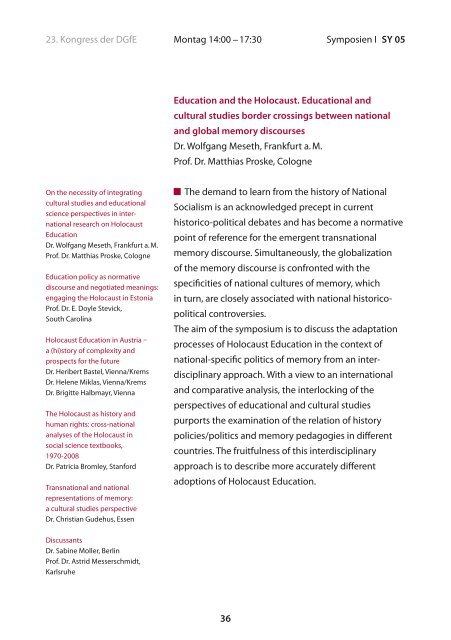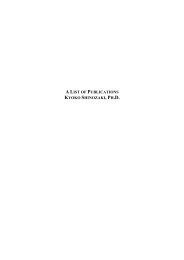Programm - Transnationale Soziale Unterstützung
Programm - Transnationale Soziale Unterstützung
Programm - Transnationale Soziale Unterstützung
Sie wollen auch ein ePaper? Erhöhen Sie die Reichweite Ihrer Titel.
YUMPU macht aus Druck-PDFs automatisch weboptimierte ePaper, die Google liebt.
23. Kongress der DGfE Montag 14:00 – 17:30<br />
Symposien I SY 05<br />
23. Kongress der DGfE Montag 14:00 – 17:30<br />
Symposien I SY 06<br />
Education and the Holocaust. Educational and<br />
cultural studies border crossings between national<br />
and global memory discourses<br />
Dr. Wolfgang Meseth, Frankfurt a. M.<br />
Prof. Dr. Matthias Proske, Cologne<br />
Entgrenzungen zwischen Realität und Virtualität –<br />
Grundlagen und Formen informeller Bildungsprozesse<br />
im Internet<br />
Prof. Dr. Manuela Pietraß, München<br />
Prof. DDr. Christina Schachtner, Klagenfurt<br />
On the necessity of integrating<br />
cultural studies and educational<br />
science perspectives in international<br />
research on Holocaust<br />
Education<br />
Dr. Wolfgang Meseth, Frankfurt a. M.<br />
Prof. Dr. Matthias Proske, Cologne<br />
Education policy as normative<br />
discourse and negotiated meanings:<br />
engaging the Holocaust in Estonia<br />
Prof. Dr. E. Doyle Stevick,<br />
South Carolina<br />
Holocaust Education in Austria –<br />
a (hi)story of complexity and<br />
prospects for the future<br />
Dr. Heribert Bastel, Vienna/Krems<br />
Dr. Helene Miklas, Vienna/Krems<br />
Dr. Brigitte Halbmayr, Vienna<br />
The Holocaust as history and<br />
human rights: cross-national<br />
analyses of the Holocaust in<br />
social science textbooks,<br />
1970-2008<br />
Dr. Patricia Bromley, Stanford<br />
Transnational and national<br />
representations of memory:<br />
a cultural studies perspective<br />
Dr. Christian Gudehus, Essen<br />
The demand to learn from the history of National<br />
Socialism is an acknowledged precept in current<br />
historico-political debates and has become a normative<br />
point of reference for the emergent transnational<br />
memory discourse. Simultaneously, the globalization<br />
of the memory discourse is confronted with the<br />
specificities of national cultures of memory, which<br />
in turn, are closely associated with national historicopolitical<br />
controversies.<br />
The aim of the symposium is to discuss the adaptation<br />
processes of Holocaust Education in the context of<br />
national-specific politics of memory from an interdisciplinary<br />
approach. With a view to an international<br />
and comparative analysis, the interlocking of the<br />
perspectives of educational and cultural studies<br />
purports the examination of the relation of history<br />
policies/politics and memory pedagogies in different<br />
countries. The fruitfulness of this interdisciplinary<br />
approach is to describe more accurately different<br />
adoptions of Holocaust Education.<br />
Kritische Lebensereignisse bewältigen<br />
– Weblogs als Ort sozialen<br />
Lernens<br />
Elisabeth Augustin, M. A., Klagenfurt<br />
‘If you’re not on Facebook, then<br />
where are you’ Identity construction<br />
across spaces and new social<br />
literacy practices<br />
PhD Julia Davies, Sheffield<br />
Die Überlagerung von Virtualität<br />
und Realität am Beispiel von<br />
Multiplayer Online Games<br />
Prof. Dr. Johannes Fromme,<br />
Magdeburg<br />
Face-to-Facebook: bioethics<br />
between the virtual and the real<br />
Dr. Joanna Zylinska, London<br />
Mit dem Internet als Informations- und Unterhaltungsplattform<br />
sowie als sozialem Netzwerk entstand<br />
ein neuer, globaler und zugleich informeller Bildungsraum.<br />
Wurden im Zeitalter der Massenmedien Realität<br />
und Medienrealität als getrennte Bereiche verstanden,<br />
so finden durch die Gestaltungs- und sozialen Partizipationsmöglichkeiten<br />
im Cyberspace Entgrenzungen<br />
zwischen Realität und Virtualität statt. Das Symposium<br />
will Grenzüberschreitungen und Brüchen nachgehen,<br />
an denen die Schnittstelle zwischen realer und digitaler<br />
Welt sichtbar wird, und erörtert wie beide Welten<br />
aufeinander bezogen werden. Die leitenden Fragen<br />
sind, welche Praktiken die Nutzer/-innen entwickeln,<br />
welche der Besonderheit einer mit digitalen Räumen<br />
verflochtenen Lebenswelt gerecht werden und welche<br />
Aufgaben die Pädagogik besitzt, wenn man auf dieser<br />
Grundlage Medienbildung bestimmen will.<br />
Montag<br />
Discussants<br />
Dr. Sabine Moller, Berlin<br />
Prof. Dr. Astrid Messerschmidt,<br />
Karlsruhe<br />
36 37





